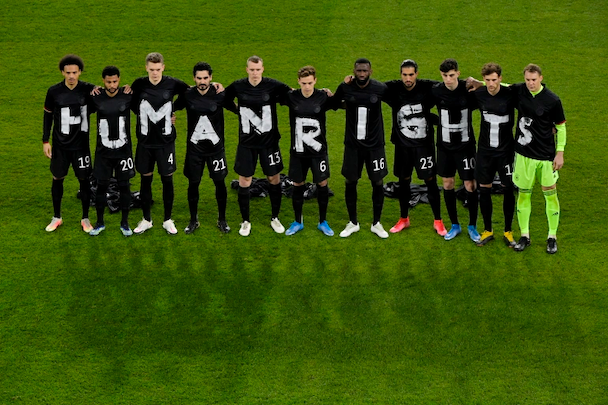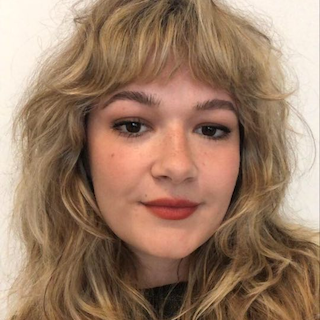‘Money talks’: how sportswashing became tournament advertisers’ biggest problem
As part of The Drum’s Sports Marketing Deep Dive, we consider the repercussions for brand proximity to sportswashing, from the World Cup in Qatar to LIV Golf.

German football players protesting the Fifa World Cup in Qatar/ Image via Reuters
You’ve heard of greenwashing, but what about sportswashing? A term popularized by Amnesty International in 2018, it has come to describe the use of sports by harmful organizations to legitimize their causes and mask their true impact.
It has been around for a lot longer than that though. As early as the 1930s and 40s, Fifa World Cups held in Italy and Germany were used to spread propaganda for the regimes of Mussolini and Hitler.
More recently, the announcement that the 2022 Fifa World Cup would be held in Qatar has been met with significant criticism due to the Saudi government’s track record on human rights issues, such as the criminalization of homosexuality, as well as its appalling treatment of migrant workers helping the city prepare for the tournament (estimates say over 400 Nepalese workers have died in construction in Qatar since the World Cup bid was won).
But sportswashing in football runs deep, from former Chelsea-owner Roman Abramovich’s affiliations with Vladimir Putin to the Saudi Public Investment Fund (PIF) ownership of Newcastle United and the home of Arsenal’s Emirates Stadium.
“The balance of the game is being massively moved in terms of power by money from questionable sources,” says Piano director and former Group M chief exec Rob Norman, who recently spoke out on a panel at Vivatech Paris against the prevalence of advertisers supporting unethical ventures in sport.
Advertisement
When it comes to sports governing bodies like Fifa, Norman says they are “allowing money of questionable facilities to actually influence the competitive nature of the game they supervise”.
Dark Horses’ chief strategy officer Matt Readman agrees that chief execs have been following the money when it comes to sports sponsorship. “With the rapid rise of professional sport in the 2000s, the emphasis for sporting CEOs and boards was to cash-in,” he says. ”Lots of rights-holders have made questionable decisions chasing profitability.”
The issue now is that broader marketing has changed over the course of the last decade. “Rightly or wrongly, brands are increasingly being driven by purpose and being seen to do the right thing,” adds Readman. ”Brands need to be very careful they don’t get caught on the wrong side. Their objective and those of the rights-holder might not be the same.”
It’s not just in football
Of course, the issue does not lie solely in football. According to Conscious Ad Network co-founder Jake Dubbins, sportwashing “follows the money”.
“It’s prevalent in football, golf, Formula 1 and even tennis, which is sponsored by huge banks like HSBC, which had to pay a $1.9bn fine for moving Mexican drug cartel money.”
Advertisement
Readman cites the LIV Golf tournament as a prime example of a sport beyond football where sportswashing is prevalent due to its backing by the Saudis. “It’s not just the corporate wealth that flows easily within it, but the role it plays in greasing the wheels of the financial machine. Saudi Arabia’s play to wrestle control away from the PGA goes beyond reputation – it’s about influence and control too.”
He says Formula 1 is different in that it is the ultimate display of glitz and glamour. But “a race that puts a city on the map” can be as an endorsement for whatever location it takes place in. “It legitimizes the locations as part of an elite global circuit,” he says, and this thinking can even be applied to global events as large as the Olympics.
How to clean it up
When it comes to tackling the issue, Norman says that, in the future, he would like to see sports governing bodies tighten their standards on sponsorship sources and where they host tournaments but adds that this does not necessarily solve the issue of brands being locked into years-long sponsorship deals before they know where tournaments are being held.
What they do have control over, he feels, is their presence and the amount they spend on activations. “I don’t mean to suggest that you can offset human rights costs like carbon emissions, but you can divert that money to roll out plans at the grassroots level.
“What about investing in underrepresented sports, like field hockey or swimming, or addressing the serious gender bias in mainstream sports? It will become a chamber of trajectory. As you unwind from one way of doing things, you can wind up into another.”
Dubbins agrees that brands ought to exercise caution when it comes to the so-called “offsetting” of unethical affiliations. He calls the support brands have shown for sports professionals coming out as LGBTQ+, for example, as being “complete hypocrisy and contradiction” when they have then gone on to sponsor tournaments in countries that criminalize homosexuality.
But the question remains, how strong do brands go? Dubbins believes they ought to take a stronger stance. “Granted, they may be tied into contracts before tournament locations are announced, but do you post on social media and donate to a relevant charity? Or is it something you’re going to take on properly?”
“In my view, you’re either pro-inclusivity, pro-sustainability and working towards creating a better society for all, or you’re pro-supporting oppressive regimes. You can’t do both.”
When it comes to the repercussions of brand proximity to sportswashing, Readman says that if they fail to make their stance on these issues clear, the risk is huge. “A partnership is an official endorsement – a shortcut to what your brand is. Brands invest millions in partnerships to improve their perception, but that goes both ways. If a sporting event becomes tainted in the eyes of fans, then that toxicity rubs off on the brand too.
“On the one hand, sport is standing up for social causes and pushing us to make environmentally-friendly decisions, to be more tolerant and take better of ourselves. But these principles go out the window as soon as there’s profit to be made from ’bad actor’ partnerships or competition expansions. This throws into question why the social cause campaigns and hashtags are flaunted in the first place.”
Not to mention, the public are becoming more vocal about their disapproval. The strong reactions from fans and 9/11 victims to US golfers signing up to the LIV series is proof of that, he says. “I think that animosity took many by surprise, including several of the players themselves. Similarly, western football fans are clearly unhappy about the World Cup in Qatar.
Advertisement
“But are they unhappy because they object to Qatar’s human rights record or because it’s moved to winter and, as traveling fans, their freedom will be severely limited? It’s hard to say.”
All parties agree that the cognitive dissonance between the public’s disdain for hypocrisy and loyalty to beloved teams and players poses the biggest threat to getting the dirt out of sportswashing, but brands could play a role in setting standards and using their presence to speak out against unethical practices in sports sponsorship, because “we shouldn’t assume all fans care,” says Readman.
The solution? “While formal partnerships clearly have their benefits, brands are increasingly exploring being on the other side of the fence – ie not an official sponsor,“ he says. “There, they can operate in the relatively safer haven of not being ’officially’ tainted. I’m not talking about old-fashioned hijacking, but these days it’s easier than ever to connect with fans around a major event.”
The issue that remains is the fact that, for so many of these sports, heritage money is tied up. As Dubbins concludes, “business as a force for good obviously has its place, but unfortunately in this world, money talks”.
Check out The Drum’s latest Deep Dive, The New Sports Marketing Playbook, and learn the tactics employed by the world’s biggest sports organizations and their star athletes to stay top of their game.
